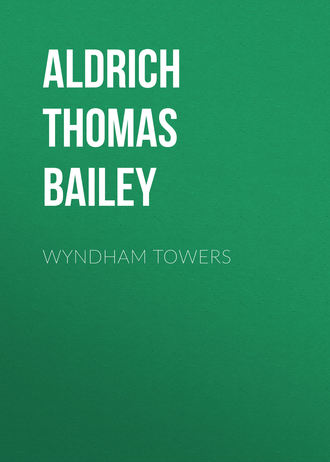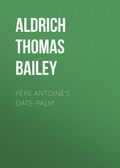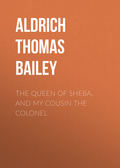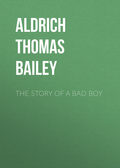полная версия

Aldrich Thomas Bailey
Wyndham Towers
Undarkened till, it so befell, these two
Meeting as they a hundred times had met
On hill-path or at crossing of the weir,
Her beauty broke on him like some rare flower
That was not yesterday. Ev’n so the Spring
Unclasps the girdle of its loveliness
Abruptly, in the North here: long the drifts
Linger in hollows, long on bough and briar
No slight leaf ventures, lest the frost’s keen tooth
Nip it, and then all suddenly the earth
Is nought but scent and bloom. So unto him
Griselda’s grace unclosed. Where lagged his wit
That guessed not of the bud that slept in stem,
Nor hint had of the flower within the bud?
If so much beauty had a tiger been,
‘T had eaten him! In all the wave-washed length
Of rocky Devon where was found her like
For excellence of wedded red and white?
Here on that smooth and sunny field, her cheek,
The hostile hues of Lancaster and York
Did meet, and, blending, make a heavenly truce,
This were indeed a rose a king might wear
Upon his bosom. By St. Dunstan, now,
Himself would wear it. Then by seeming chance
Crossed he her walks, and stayed her with discourse
Devised adroitly; spoke of common things
At first—of days when his good mother lived,
If ‘t were to live, to pass long dolorous hours
Before his father’s effigy in church;
Of one who then used often come to hall,
Ever at Yule-tide, when the great log flamed
In chimney-place, and laugh and jest went round,
And maidens strayed beneath the mistletoe,
Making believe not see it, so got kissed—
Of one that joined not in the morrice-dance,
But in her sea-green kirtle stood at gaze,
A timid little creature that was scared
By dead men’s armor. Nought there suffered change,
Those empty shells of valor grew not old,
Though something rusty. Would they fright her now
Looked she upon them? Held she in her mind—
‘T was Spring and loud the mavis piped outside—
The day the Turkish helmet slipped from peg,
And clashing on the floor, congealed her blood
And sent both hands to terror-smitten eyes,
She trembling, ready to yield up the ghost?
Right merry was it! Finally he touched
On matters nearer, things she had foreboded
And this one time must needs lend hearing to,
And end so sorry business ere woe came,
Like a true maid and honest, as she was.
So, tutoring the tremble on her lip
And holding back hot tears, she gave reply
With such discretion as straight tied his tongue,
Albeit he lacked not boldness in discourse:
“Indeed, indeed, sir, you speak but in jest!
Lightly, not meaning it, in courtier-way.
I have heard said that ladies at the Court—
I judge them not!—have most forgiving ears,
And list right willingly to idle words,
Listen and smile and never stain a cheek.
Yet not such words your father’s son should use
With me, my father’s daughter. You forget
What should most precious be to memory’s heart,
Love that dared death; and so, farewell.” Farewell
It was in sooth; for after that one time,
Though he had fain with passion-breathed vows
Besieged that marble citadel her breast,
He got no speech of her: she chose her walks;
Let only moon and star look on the face
That could well risk the candor of the sun;
Ran not to lattice at each sound of hoof;
By stream or hedge-row plucked no pansies more,
Mistrusting Proserpina’s cruel fate,
Herself up-gathered in Sicilian fields;
At chapel—for one needs to chapel go
A-Sunday—glanced not either right or left,
But with black eyelash wedded to white cheek
Knelt there impassive, like the marble girl
That at the foot-end of his father’s tomb,
Inside the chancel where the Wyndhams lay,
Through the long years her icy vigil kept.
As leaves turn into flame at the frost’s touch,
So Richard’s heart on coldness fed its fire,
And burned with surfeit of indifference.
All flavor and complexion of content
Went out of life; what served once served no more.
His hound and falcon ceased to pleasure him;
He read—some musty folios there were
On shelf—but even in brave Froissart’s page,
Where, God knows, there be wounds enough, no herb
Nor potion found he to purge sadness with.
The gray dust gathered on the leaf unturned,
And then the spider drew his thread across.
Certain bright coins that he was used to count
With thrill at fingers’ ends uncounted lay,
Suddenly worthless, like the conjurer’s gold
That midst the jeers and laughter of the crowd
Turns into ashes in the rustic’s hand.
Soft idleness itself bore now a thorn
Two-pronged with meditation and desire.
The cold Griselda that would none of him!
The fair Griselda! Not alone by day,
With this most solid earth beneath his feet,
But in the weird and unsubstantial sphere
Of slumber did her beauty hold him thrall.
Herself of late he saw not; ‘t was a wraith
He worshipped, a vain shadow. Thus he pined
From dawn to dusk, and then from dusk to dawn,
Of that miraculous infection caught
From any-colored eyes, so they be sweet.
Strange that a man should let a maid’s slim foot
Stamp on his happiness and quench it quite!
With what snail-pace the traitor time creeps by
When one is out with fortune and undone!
how tauntingly upon the dial’s plate
The shadow’s finger points the dismal hour!
Thus Wyndham, with hands clasped behind his back,
Watching the languid and reluctant sun
Fade from the metal disk beside the door.
The hours hung heavy up there on the hill,
Where life was little various at best
And merriment had long since ta’en its flight.
Sometimes he sat and conned the flying clouds
Till on dusk’s bosom nestled her one star,
And spoke no word, nor seemed alive at all,
But a mere shape and counterfeit of life;
Or, urged by some swift hunger for green boughs,
Would bid the hound to heel, and disappear
Into the forest, with himself communing
For lack of gossip. So do lonely men
Make themselves tedious to their tedious selves.
Thus passed he once in a white blaze of noon
Under his oaks, and muttered as he went:
“‘My father’s daughter’ and ‘your father’s son’!
Faith, but it was a shrewd and nimble phrase,
And left me with no fitting word at tongue.
The wench hath wit and matter of her own,
And beauty, that doth seldom mate with wit,
Nature hath painted her a proper brown—
A russet-colored wench that knows her worth.
And mincing, too—should have her ruff propt up
With supertasses, like a dame at Court,
And go in cloth-of-gold. I’ll get a suit
Of Genoa velvet, and so take her eye.
Has she a heart? The ladies of Whitehall
Are not so skittish, else does Darrell lie
Most villainously. Often hath he said
The art of blushing ‘s a lost art at Court.
If so, good riddance! This one here lets love
Play beggar to her prudery, and starve,
Feeding him ever on looks turned aside.
To be so young, so fair, and wise withal!
Lets love starve? Nay, I think starves merely me.
For when was ever woman logical
Both day and night-time? Not since Adam fell!
I doubt a lover somewhere. What shrewd bee
Hath buzzed betimes about this clover-top?
Belike some scrivener’s clerk at Bideford,
With long goose-quill and inkhorn at his thigh—
Methinks I see the parchment face of him;
Or one of those swashbuckler Devon lads
That haunt the inn there, with red Spanish gold,
Rank scurvy knaves, ripe fruit for gallows-tree;
Or else the sexton’s son”—here Wyndham laughed,
Though not a man of mirth—indeed, a man
Of niggard humor; but that sexton’s son—
Lean as the shadow cast by a church spire,
Eyes deep in the sockets, noseless, high cheek-boned,
Like nothing in the circle of this earth
But a death’s-head that from a mural slab
Within the chancel leers through sermon-time,
Making a mock of poor mortality.
The fancy touched him, and he laughed a laugh
That from his noonday slumber roused an owl
Snug in his oaken hermitage hard by.
A very rare conceit—the sexton’s son!
Not he, forsooth; he smacked of churchyard mould
And musty odors of moth-eaten palls—
A living death, a walking epitaph!
No lover that for tingling flesh and blood
To rest soft cheek on and change kisses with.
Yet lover somewhere; from his sly cocoon
Time would unshell him. In the interim
What was to do but wait, and mark who strolled
Of evenings up the hill-path and made halt
This side the coppice at a certain gate?
For by that chance which ever serves ill ends,
Within the slanted shadow of The Towers
The maid Griselda dwelt. Her gray scarred sire
Had for cloth doublet changed the steel cuirass,
The sword for gardener’s fork, and so henceforth
In the mild autumn and sundown of life,
Moving erect among his curves and squares
Of lily, rose, and purple flower-de-luce,
Set none but harmless squadrons in the field—
Save now and then at tavern, where he posed,
Tankard in hand and prattling of old days,
A white-mustached epitome of wars.
How runs the proverb touching him who waits?
Who waits shall have the world. Time’s heir is he,
Be he but patient. Thus the thing befell
Wherefrom grew all this history of woe:
Haunting the grounds one night, as his use was
Who loved the dark as bats and owlets do,
Wyndham got sound of voices in the air
That did such strange and goblin changes ring
As left him doubtful whence the murmurs came,
Now here, now there, as they were winged things—
Such trick plays Echo upon hapless wight
Chance-caught in lonely places where she dwells,
Anon a laugh rang out, melodious,
Like the merle’s note when its ecstatic heart
Is packed with summer-time; then all was still—







